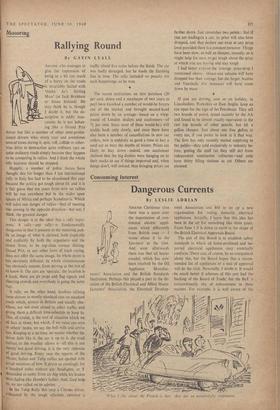Motoring
Rallying Round
By GAVIN
LYALL
ANYONE who manages to give the impression of being in a bit too much of a hurry on the roads is invariably hailed with Happily, a number of police forces have thought this for longer than I (an international rally in Italy has had to be abandoned this year because the polizia got tough about it), and it is a fair guess that ten years from now no rallies will be run anywhere but in the wider open spaces of Africa and perhaps Scandinavia. Which will solve one danger of rallies—that of meeting one coming in the opposite direction—but not, I think, the greatest danger.
This danger is in the ideal that a rally repre- sents. A rally—any rally—is fundamentally dangerous in that it presents to the motoring pub- lic an image of what is claimed, both implicitly and explicitly by both the organisers and the motor firms, to be top-class normal driving. Grand Prix, or any other form of track racing, does not offer the same image. Its whole point is too obviously different, its whole circumstances too obviously remote, from driving as the rest of us know it. The cars are 'specials,' the location is a track, there are pit stops and flag signals and cheering crowds and everybody is going the same Way.
A rally, on the other hand, involves turning loose drivers in mostly standard cars on standard roads which, always in Britain and usually else- Where, are not even closed to other traffic, and giving them a difficult time-schedule to keep to. This, of course, is the sort of situation which we all face at times; but which, if we value our own or others' necks, we say the hell with and arrive /ate. Keeping to a set time, no matter whether the driver feels like it, the car is up to it, the road surface or the weather allows it--all this is not Merely not good driving, it is the very opposite of good driving. Every year the reports of the Monte, Safari and Tulip rallies are spotted with Jovial mentions of how X drove so cunningly for a hundred miles without any headlights, or Y descended so nobly from an Alp while his brakes Were fading like Hamlet's father. And, God help us, we are called on to admire.
In the Tulip Rally this year a Citroen driver, exhausted by the tough schedule, rammed a traffic island five miles before the finish The car was badly damaged, but he made the finishing line in time. The rally included no penalty for such happenings, so he won The recent restrictions on hire purchase (20 per cent. down and a maximum of two years to pay) have knocked a number of would-be buyers out of the market and brought second-hand prices down by an average--based on a whip- round of London dealers and auctioneers—of 71 per cent. Since most of these would-be's will trickle back only slowly. and since there have also been a number of cancellations in new car orders, now is suddenly as good a time to buy a used car as were the depths of winter. Prices are likely to Stay down--indeed, one auctioneer claimed that the big dealers were hanging on to their stocks to see if things improved and, when things don't, will unload, thus bringing prices }et farther down. Just remember two points: that if you are trading-in a car, its price will also have dropped, and that dealers can exist at any price level provided there is a constant turnover. Things have been slow, as well as cheaper, recently, so it might help for once to get tough shout the price at which you are bming and stay tough I had better expand the 'average price-drop I mentioned above. Minor-size saloons will have dropped less than average, but the larger Austins and Vauxhalls (for instance) will have come down by more If you are driving, now or on holiday. in Lincolnshire, Yorkshire or East Anglia, keep an eye open for the sign of Jet Petroleum. They sell two brands of petrol, tested recently by the AA and found to be almost exactly equivalent to the two top brands of other petrols, but 6d. a gallon cheaper. Just about one free gallon in every ten, if you prefer to look at it that way. The firm has only recently started supplying to the public—they sold exclusively to industry be- fore, getting the stuff (as they still do) from independent continental, ' refineries—and only have thirty filling stations as yet. Others arc planned.










































 Previous page
Previous page